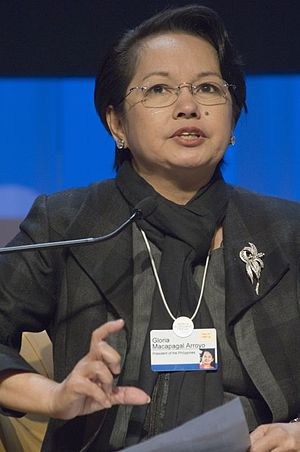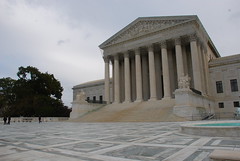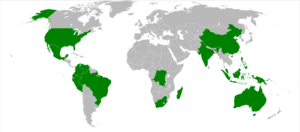Case of Political Substitution
With the start of filing of certificates of candidacies for the 2010 presidential elections, a question arises whether Senator Jingoy Estrada can substitute for his father, the former President Erap Estrada, in the event of the latter's disqualification, especially in the light of the Constitutional provision prohibiting elected Presidents from seeking reelection.
Stated in political terms, will it be wise to create an initial bandwagon for Erap by letting him file his certificate of candidacy so that Jingoy can ride eventually on the possible 'ground swell' of votes as a substitute
candidate in the event of Erap's disqualification? This scenario is a possibility as the younger Estrada has declared his readiness to fill in the shoes of his father in the event that the COMELEC and the
Supreme Court rule that latter is no longer eligible to seek the presidency.
The answer to the legal issue was settled by the Supreme Court ten (10) years ago, in G.R. No. 136351 promulgated in July 28, 1999, in the case of JOEL G. MIRANDA vs. ANTONIO M. ABAYA and the COMMISSION ON ELECTIONS.
In the above-named case, Jose “Pempe” Miranda, then incumbent
mayor of
Santiago City, Isabela, filed his certificate of candidacy for the same mayoralty post for the synchronized May 11, 1998 elections. Antonio M. Abaya filed a Petition to Deny Due Course to and/or Cancel Certificate of Candidacy of Miranda, which the COMELEC granted.
After the deadline for filing a certificate of candidacy, Joel G. Miranda filed his certificate of candidacy for the mayoralty post, supposedly as a substitute for his father, Jose “Pempe” Miranda.
During the May 11, 1998 elections, Joel Miranda won by only 1,666 votes against Antonio Abaya. Abaya filed a Petition to Declare Null and Void Substitution of Joel Miranda as he sought nullification of Miranda’s certificate of candidacy for being
void ab initio because the certificate of candidacy of Jose “Pempe” Miranda, whom petitioner was supposed to substitute, had already been canceled and denied due course. The COMELEC thereafter nullified the substitution of Joel Miranda of his father as mayoralty candidate.
In the Supreme Court, Miranda insists that the substitution is allowed under Section 77 of the Omnibus Election Code which provides:
SEC. 77. Candidates in case of death, disqualification or withdrawal. — If after the last day for the filing of certificates of candidacy, an official candidate of a registered or accredited
political party dies, withdraws or is disqualified for any cause, only a person belonging to, and certified by, the same political party may file a certificate of candidacy to replace the candidate who died, withdrew or was disqualified. The substitute candidate nominated by the political party concerned may file his certificate of candidacy for the office affected in accordance with the preceding sections not later than mid-day of the day of the election. If the death, withdrawal or disqualification should occur between the day before the election and mid-day of election day, said certificate may be filed with any board of election inspectors in the political subdivision where he is a candidate, or, in the case of candidates to be voted for by the entire electorate of the country, with the Commission.
Petitioner capitalizes on the fact that the Comelec ruled to disqualify Jose “Pempe” Miranda in the May 5, 1998 resolution and he heavily relies upon the above-quoted provision allowing substitution of a candidate who has been disqualified for any cause.
While there is no dispute as to whether or not a nominee of a registered or accredited political party may substitute for a candidate of the same party who had been disqualified for any cause, this does not include those cases where the certificate of candidacy of the person to be substituted had been denied due course and cancelled under Section 78 of the Code.
Expressio unius est exclusio alterius. While the
law enumerated the occasions where a candidate may be validly substituted, there is no mention of the case where a candidate is excluded not only by disqualification but also by denial and cancellation of his certificate of candidacy. Under the foregoing rule, there can be no valid substitution for the latter case, much in the same way that a nuisance candidate whose certificate of candidacy is denied due course and/or cancelled may not be substituted. If the intent of the lawmakers were otherwise, they could have so easily and conveniently included those persons whose certificates of candidacy have been denied due course and/or cancelled under the provisions of Section 78 of the Code.
More importantly, under the express provisions of Section 77 of the Code, not just any person, but only “an official candidate of a registered or accredited political party” may be substituted. In Bautista vs. Comelec (G.R. No. 133840, November 13, 1998) this Court explicitly ruled that “a cancelled certificate does not give rise to a valid candidacy” (p.13).
A person without a valid certificate of candidacy cannot be considered a candidate in much the same way as any person who has not filed any certificate of candidacy at all can not, by any stretch of the imagination, be a candidate at all.
The law clearly provides:
SEC. 73. Certificate of candidacy — No person shall be eligible for any elective public office unless he files a sworn certificate of candidacy within the period fixed herein.
By its express language, the foregoing provision of law is absolutely mandatory. It is but logical to say that any person who attempts to run for an elective office but does not file a certificate of candidacy, is not a candidate at all. No amount of votes would catapult him into office. In Gador vs. Comelec (95 SCRA 431 [1980]), the Court held that a certificate of candidacy filed beyond the period fixed by law is void, and the person who filed it is not, in law, a candidate. Much in the same manner as a person who filed no certificate of candidacy at all and a person who filed it out of time, a person whose certificate of candidacy is cancelled or denied due course is no candidate at all. No amount of votes should entitle him to the elective office aspired for.
The evident purposes of the law in requiring the filing of certificates of candidacy and in fixing the time limit therefor are: (a) to enable the voters to know, at least sixty days before the regular election, the candidates among whom they are to make the choice, and (b) to avoid confusion and inconvenience in the tabulation of the votes cast. For if the law did not confine the choice or election by the voters to the duly registered candidates, there might be as many persons voted for as there are voters, and votes might be cast even for unknown or fictitious persons as a mark to identify the votes in favor of a candidate for another office in the same election. (Monsale vs. Nico, 83 Phil. 758 [1949])
It is at once evident that the importance of a valid certificate of candidacy rests at the very core of the
electoral process. It cannot be taken lightly, lest there be anarchy and chaos. Verily, this explains why the law provides for grounds for the cancellation and denial of due course to certificates of candidacy.
After having considered the importance of a certificate of candidacy, it can be readily understood why in Bautista we ruled that a person with a cancelled certificate is no candidate at all. Applying this principle to the case at bar and considering that Section 77 of the Code is clear and unequivocal that only an official candidate of a registered or accredited party may be substituted, there demonstrably cannot be any possible substitution of a person whose certificate of candidacy has been cancelled and denied due course.
Also, under ejusdem generis rule, where a general word or phrase (such as “disqualification for any cause” in this case) follows an enumeration of particular and specific words of the same class (such as the words “dies” and “withdraws” in the instant case) or where the latter follow the former, the general word or phrase is to be construed to include, or to be restricted to persons, things or cases akin to, resembling, or of the same kind or class as those specifically mentioned (see: Vera vs. Cuevas, 90 SCRA 379 [1979]). A deceased candidate is required to have duly filed a valid certificate of candidacy, otherwise his political party would not be allowed to field a substitute candidate in his stead under Section 77 of the Code. In the case of withdrawal of candidacy, the withdrawing candidate is required to have duly filed a valid certificate of candidacy in order to allow his political party to field a substitute candidate in his stead. Most reasonable it is then, under the foregoing rule, to hold that a valid certificate of candidacy is likewise an indispensable requisite in the case of a substitution of a disqualified candidate under the provisions of Section 77 of the Code, just as it is in the two previous instances.
Furthermore, interpretatio talis in ambiguis semper freinda est, ut eviatur inconveniens et absurdum, meaning, where there is ambiguity, such interpretation as will avoid inconvenience and absurdity shall in all cases be adopted. To include those disqualified candidates whose certificate of candidacy had likewise been denied due course and/or cancelled among those who may be substituted under Section 77 of the Omnibus Election Code, leads to the absurdity where a substitute is allowed to take the place of somebody who had not been a candidate in the first place—a person who did not have a valid certificate of candidacy prior to substitution. Nemo dat quod non habet. What right can a non-candidate pass on to his substitute? Clearly, there is none because no one can give what he does not have.
Even on the most basic and fundamental principles, it is readily understood that the concept of a substitute presupposes the existence of the person to be substituted, for how can a person take the place of somebody who does not exist or who never was. The Court has no other choice but to rule that in all the instances enumerated in Section 77 of the Omnibus Election code, the existence of a valid certificate of candidacy seasonably filed is a requisite sine qua non.
All told, a disqualified candidate may only be substituted if he had a valid certificate of candidacy in the first place because, if the disqualified candidate did not have a valid and seasonably filed certificate of candidacy, he is and was not a candidate at all. If a person was not a candidate, he cannot be substituted under Section 77 of the Code. Besides, if we were to allow the so-called “substitute” to file a “new” and “original” certificate of candidacy beyond the period for the filing thereof, it would be a crystalline case of unequal protection of the law, an act abhorred by our Constitution.
From the foregoing discussion it is evident that the controversy at hand is not a simple case of hair-splitting. A candidate may not be qualified to run for election but may have filed a valid certificate of candidacy. Another candidate may likewise be not qualified and at the same time not have a valid certificate of candidacy, for which reason, said certificate of candidacy is also canceled and/or denied due course. Or, a third candidate may be qualified but, his certificate of candidacy may be denied due course and/or canceled. This is possible because the grounds for disqualification (see: Omnibus Election Code, Section 68 — Disqualifications) are totally separate and distinct from the grounds for cancellation and/or denying due course to a certificate of candidacy (Ibid., Section 69— nuisance candidates; and Section 78 — material misrepresentation). Only the candidate who had a valid certificate of candidacy may be substituted.
The question to settle next is whether or not aside from Joel “Pempe” Miranda being disqualified by the Comelec in its May 5, 1998 resolution, his certificate of candidacy had likewise been denied due course and canceled.
The Supreme Court ruled that it was.
Summary and Comments
In short, the rule on substitution under the Omnibus Election Code allows for replacement in case the official candidate “dies, withdraws or disqualified for any cause.” It does not allow substitution when the certificate of candidacy is void from the start, as what happened in the above-cited Miranda case, where the Supreme Court stressed that substitution does not apply in cases where the CoC of the candidate to be replaced has been denied due course and canceled under Section 78 of the Omnibus Election Code.
Section 78 states that, in case a person who has filed his certificate of candidacy has committed false misrepresentation, a petition to cancel the certificate of candidacy may be filed against the candidate. A disqualified candidate can only be substituted if he had a valid certificate of candidacy, and if he did not have a valid certificate of candidacy, he is and was not a candidate at all.
According to noted election lawyer Romulo Macalintal, a candidate whose CoC has been cancelled “due to material misrepresentation,” was not a candidate to begin with and therefore cannot be substituted. In Estrada’s case, the CoC can be the subject of a cancellation for misrepresentation since he is not eligible to run for president in the first place. Hence, if it was as if no CoC was filed, so there is nobody to be substituted. If Estrada files his CoC for president, the Comelec, as part of its ministerial duty, has to accept his application. However, a petition to deny due course to his CoC should be in order, considering the constitutional issues surrounding his case.
Unfortunately, it may take time before the Supreme Court may finally rule on the validity of the substitution of Jingoy, and in the meantime, the name of Erap may still appear in the list of candidates for President to be voted. It is also possible that the Supreme Court may have a change of heart on the issue, as the above-cited case of Miranda had four (4) dissenting Justices which included the incumbent Chief Justice Reynato Puno.
 Image via Wikipedia
Image via Wikipedia
![Reblog this post [with Zemanta]](http://img.zemanta.com/reblog_e.png?x-id=0bb67057-7986-4dac-8cc1-323f0148ffac)













![Reblog this post [with Zemanta]](http://img.zemanta.com/reblog_e.png?x-id=3849d6f8-8762-414a-a9f1-d904a8921b8e)



![Reblog this post [with Zemanta]](http://img.zemanta.com/reblog_e.png?x-id=13cad73d-b2f3-4c8c-a1ba-c31cc88ba361)

![Reblog this post [with Zemanta]](http://img.zemanta.com/reblog_e.png?x-id=a3e670a8-84b7-46e8-9196-bda7f904d986)






